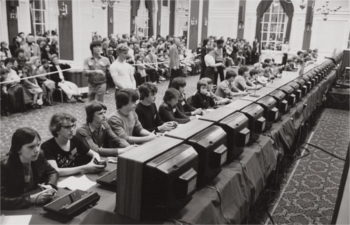I remember when I was 12-13, and played wrestling and fighting games with
friends. I rarely ever won a match and we all took it far too
seriously, but it was fun. Video broadcasting sites such as Stickam and
Justin.tv (now better known as Twitch.TV) weren't too big,
but Let's Plays were starting to come out pretty frequently. Now it's
possible to make a living off of playing video games thanks to sites
like YouTube and blip.tv, which allow content creators and streamers to earn money through various means.
But, the major question is this: can playing video games professionally be considered a new sport? The answer to this question is (depending on your view) a resounding "yes."
The first proof to show for this is that South Korean Kim Dong-hwan, a professional StarCraft 2 player, has received a special U.S. visa. The visa in question is usually reserved for professional athletes. The visa in question "applies to you if you are coming to the U.S. temporarily to perform at a specific athletic competition as an athlete, individually or as part of a group or team, at an internationally recognized level of performance." According to this, Dong-hwan is, at least in the eyes of the U.S. Citizenship and Immigration Services, a professional athlete.
But, the major question is this: can playing video games professionally be considered a new sport? The answer to this question is (depending on your view) a resounding "yes."
The first proof to show for this is that South Korean Kim Dong-hwan, a professional StarCraft 2 player, has received a special U.S. visa. The visa in question is usually reserved for professional athletes. The visa in question "applies to you if you are coming to the U.S. temporarily to perform at a specific athletic competition as an athlete, individually or as part of a group or team, at an internationally recognized level of performance." According to this, Dong-hwan is, at least in the eyes of the U.S. Citizenship and Immigration Services, a professional athlete.
The second bit of proof to prove this comes from YouTube and Twitch.TV. If you look around, you'll easily find that people who do live performances of League of Legends and Starcraft 2 matches will gain huge amounts of viewers. My first viewing at 1:06 AM has 3 streams of non-professional League of Legends players holding 22,000+ viewers, 6,600+ viewers and 5,000+ viewers. YouTube players who play League of Legends can range from 100 subscribers to 500,000+ subscribers as well.
The third and last bit of proof comes from an article in the LA Times which reported a final match championship in a game of League of Legends. The match was hosted in a packed Staples Center with more then 13,000 people watching the game. The combined prize money for the 3 StarCraft 2 world championship series is a breathtaking $1.6 million.
Professional gaming is not without it's cons, sadly.
Dong-hwan has been traveling back and forth between the United States and South Korea under a visa waiver to compete in live matches according to his manager, Andrew Tomlinson. Live matches would be broadcasted to thousands of viewers in person while professional commentators would narrate these matches for millions of online viewers across multiple streaming sites (mainly Twitch.tv). Last fall, Kim was told that because he had been coming in and out of the country so frequently, he would be unable to come back without an official visa (the same one mentioned at the start of the article).
Marcus Graham, a senior manager at the streaming site Twitch.tv commented on why this is a big problem. "It would be very similar to an athlete who would be unable to compete for a year," Graham says. "He's at the peak of his professional gaming career."
Kim proceeded to apply for a student visa, but his application was denied. Later, Twitch and Blizzard Entertainment, the company that made StarCraft 2, helped Kim get his visa by writing recommendation letters to the Citizenship and Immigration services.
Graham continued to comment on the issue with "[Competitive gamers like Kim] are the best of the best. They compete for hundreds of thousands of dollars every year; they do spend 10 to 12 hours every day practicing."
Dong-hwan will be back in the U.S. next Monday, but Kim Phan, a senior manager at Blizzard Entertainment, says there are "a handful" of other gamers who are still without a visa to enter the United States. "Gaming is their full-time job, so the inability to go to a tournament, to travel and compete is preventing them from doing their job," says Graham of Twitch. "Visas have single-handedly been one of the biggest killers of players' careers. These problems have been plaguing us even as early as 2002."
Despite the problems that Graham stated, many broadcasters, esport athletes and their fans still have faith that they'll begin to see more esport events with less problems in the coming years.
What are your thoughts on this? Do you like the fact that professional gaming is now an official sport? Or are you displeased with the news that professional gaming is slowly turning as normal as baseball in the United States?




No comments:
Post a Comment